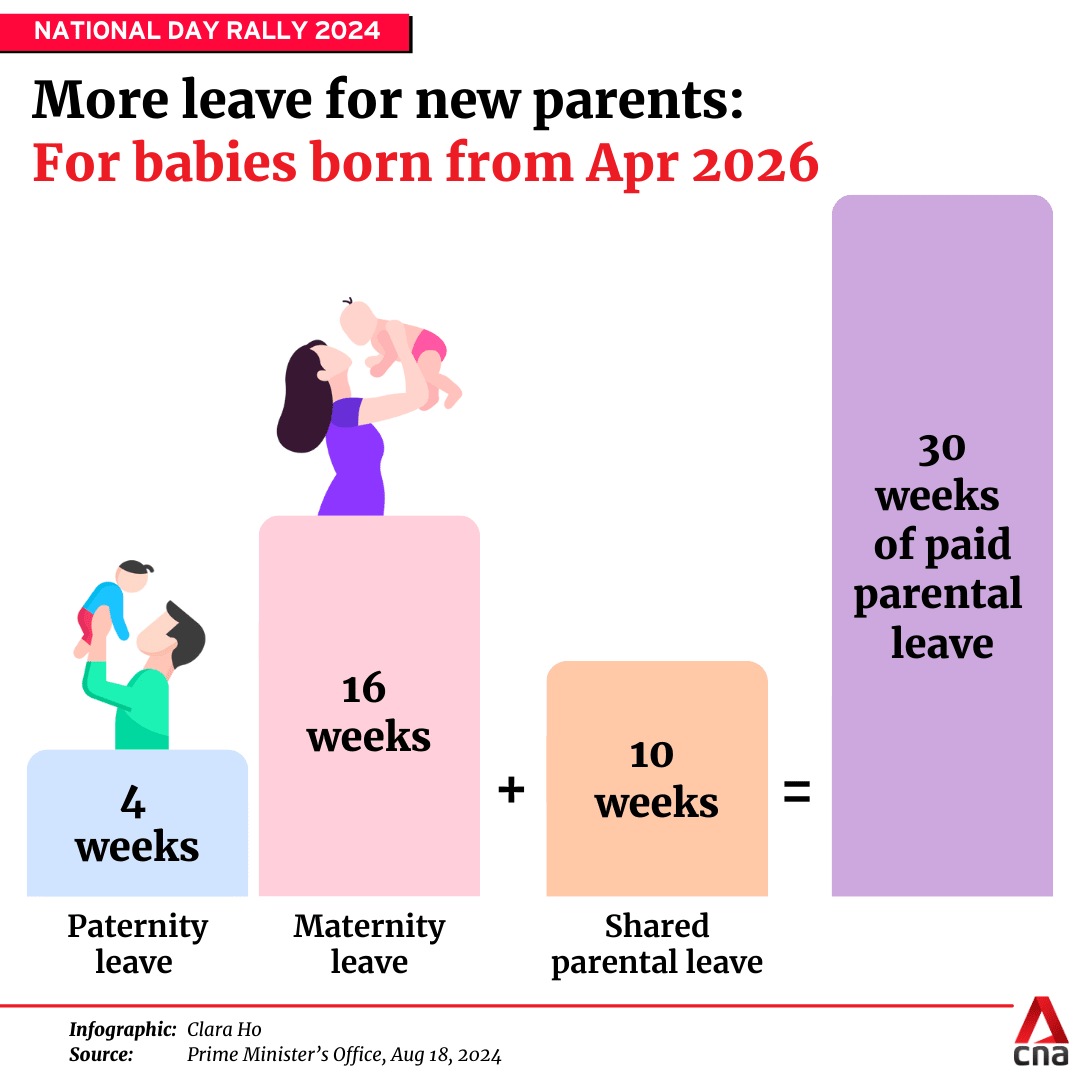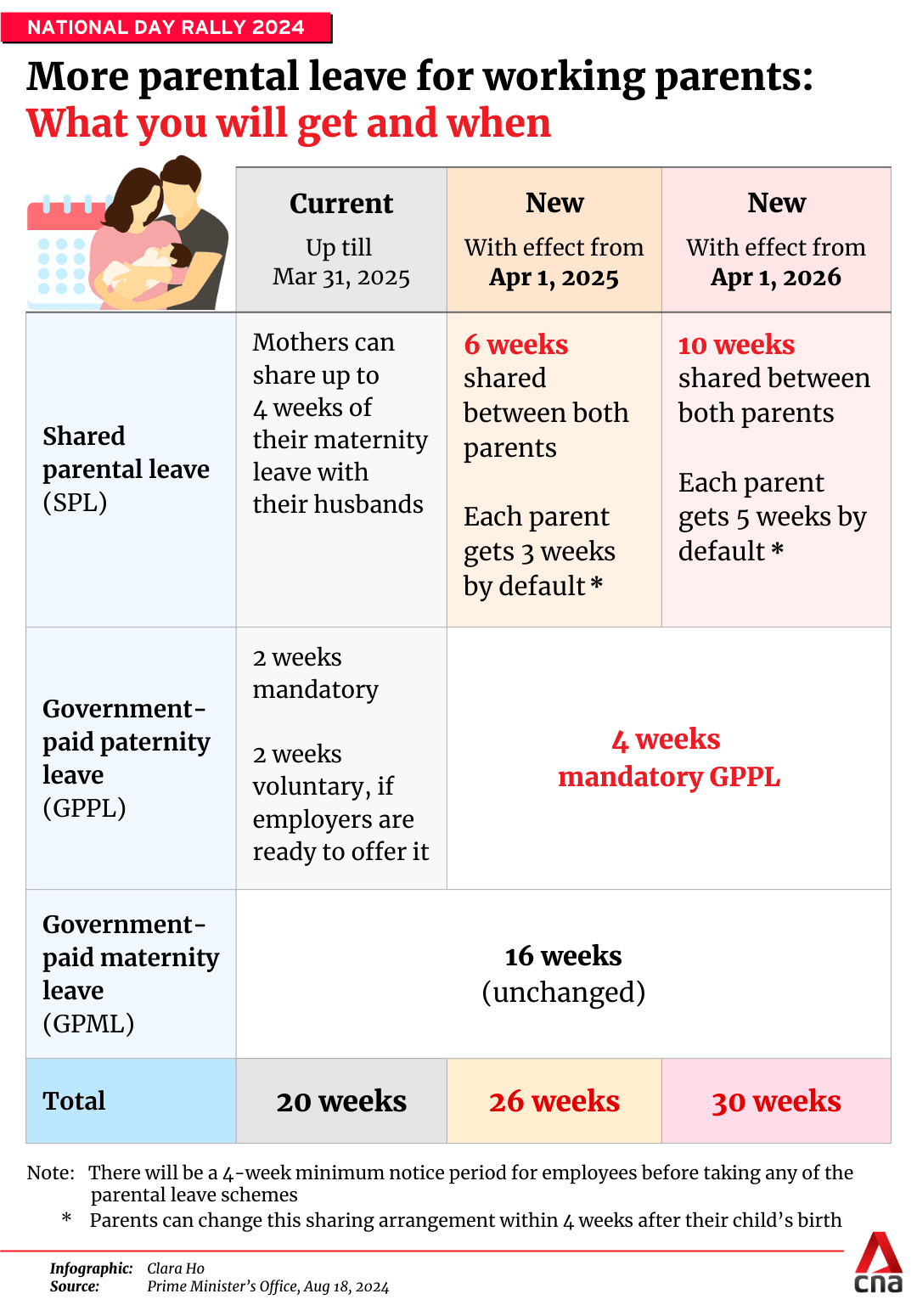Parents welcome increased parental leave, with some considering having more children
Parents will get an additional 10 weeks of shared leave to care for their babies when a new scheme is fully implemented on Apr 1, 2026.

The announcement could help push those who are on the margins, such as double income no kids (DINK) couples or those who decided that one child is enough, said Sociology professor Paulin Straughan. (File photo: iStock/Edwin Tan)

This audio is generated by an AI tool.
SINGAPORE: When one mother, who only wanted to be known as Ms Toh, heard the news about increased parental leave, she was delighted.
The 29-year-old gave birth to her first child in February last year and is expecting her second in October.
While Ms Toh will not be eligible for the new parental leave scheme since it will only kick in from Apr 1 next year, she said that the increased leave was attractive enough to make her consider having more children.
During his National Day Rally speech on Sunday (Aug 18), Prime Minister Lawrence Wong announced that parents will get an additional 10 weeks of shared leave to care for their babies when a new scheme is fully implemented on Apr 1, 2026.
The new scheme will be rolled out in phases to manage the impact on employers, and give them time to adjust their operational and manpower arrangements.
Mr Wong also announced that new fathers will get four weeks of government-paid paternity leave, up from the current two weeks’ mandatory leave.

These changes, which are part of the government's efforts to provide stronger caregiving support for parents, will bring the total paid leave to 30 weeks or about 7.5 months, up from the current 20 weeks.
“Currently, paid childcare leave is too little, especially when you have two or three children,” said Ms Toh, adding that she went back to work after three months of maternity leave so that she could save the additional four weeks in case her child fell sick, and she had to take leave.
“The six-day childcare leave is really not enough so with this additional ten weeks of shared leave, it’s really enough for us to take care of our children.”
Similarly, Ms Elizabeth Teh, who has a one-year-old son and is hoping to have more, welcomed the increased parental leave as it would give her and her husband more time to care for their children in future.
“Any additional time that you can take with your child, during those formative months, is definitely a game changer because the first few months, especially when the child is born, is hard work,” said the 30-year-old.
“A lot of time and effort is spent raising the child so, having just this additional time to be with your child and to be together as a family unit is so precious,” she added.
Mr Eric Wu, who got married in March this year, said he and his wife are now more inclined to have children due to the increased parental leave.
“There are still things to consider like the cost of living, nursery fees as well as the change in lifestyle, but the increased leave is promising because it means that there’s more time to take care of your children,” said the 34-year-old.
“The increased leave allows me to share the load with my wife and personally, I feel that being around with my kid in his or her early development is very important," he added.

CONVINCING THOSE ON THE MARGINS TO HAVE KIDS
The latest round of support for parents comes after Singapore’s resident total fertility rate fell below 1 for the first time in its history, to 0.97 in 2023.
Sociology professor Paulin Straughan said the government’s move to increase parental leave will complement its existing suite of measures to encourage people to have more children.
“In Singapore, we already have a very strong pro-family package already which costs us a lot of money and the one thing that is still lacking is the time resource,” said Professor Straughan.
“Work-life balance … seems to be the pain point for parents with young children.
“The idea of having a homemaker is not tenable for many families, because the cost of living is high and of course, work is more than just money so women are very reluctant to give up on a career and all the things that come with having a career just to raise children.”
While the announcement would most definitely be welcomed by those who have already decided to have children, Prof Straughan said it could also help to push those who are on the margins.
“We need to convince those who are sitting on the margin, in other words, the DINK (dual income no kids) or those who decided that one child is enough because these two groups could be encouraged to be a little bit more confident right in their family formation.”
Meanwhile, companies CNA spoke to said they were supportive of the new policy, especially since the government will be paying for the additional leave.
Mr Ian Lee, who is the president of geographic regions at The Adecco Group, said the execution of the policy takes into consideration that both employees and employers need to have ample time to prepare for the backup plan when the employees take parental leave.
To utilise any of the parental leave schemes, new parents must inform their employers at least four weeks in advance.
This applies to government-paid maternity and paternity leave, the new shared parental leave as well as adoption leave.
Banks DBS and OCBC also expressed their support for the increased parental leave, adding that they also have benefits such as grants to defray the medical expenses of giving birth and giving preferential rates for in-house childcare centres at a few of their offices.
















